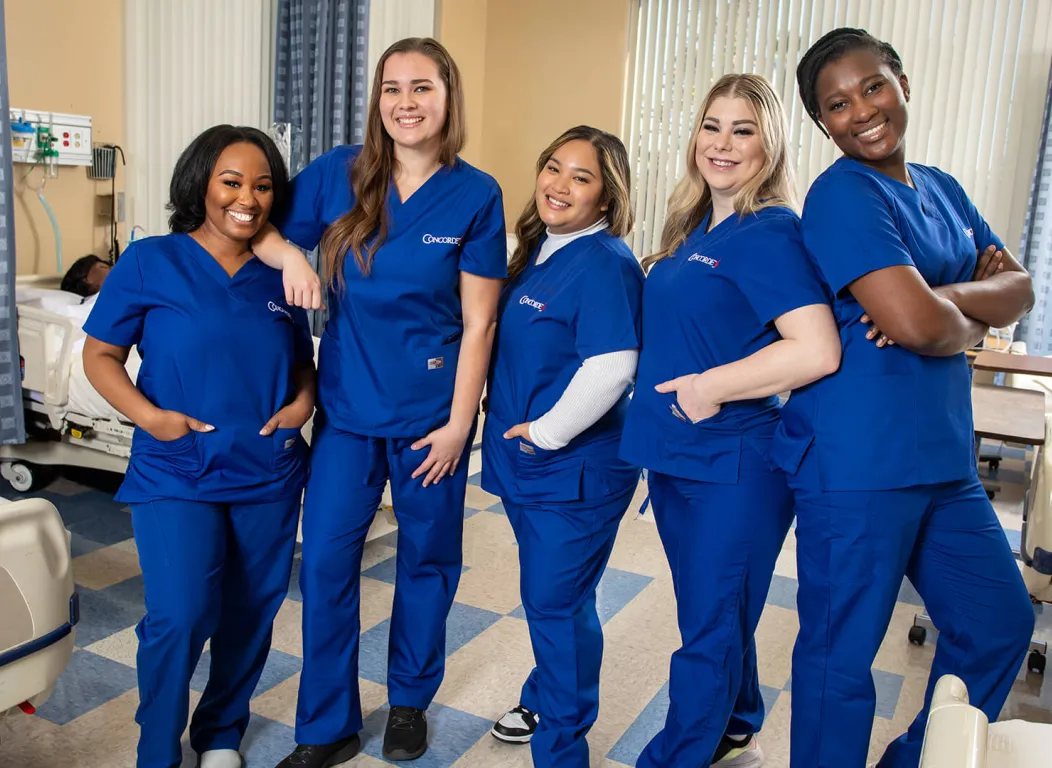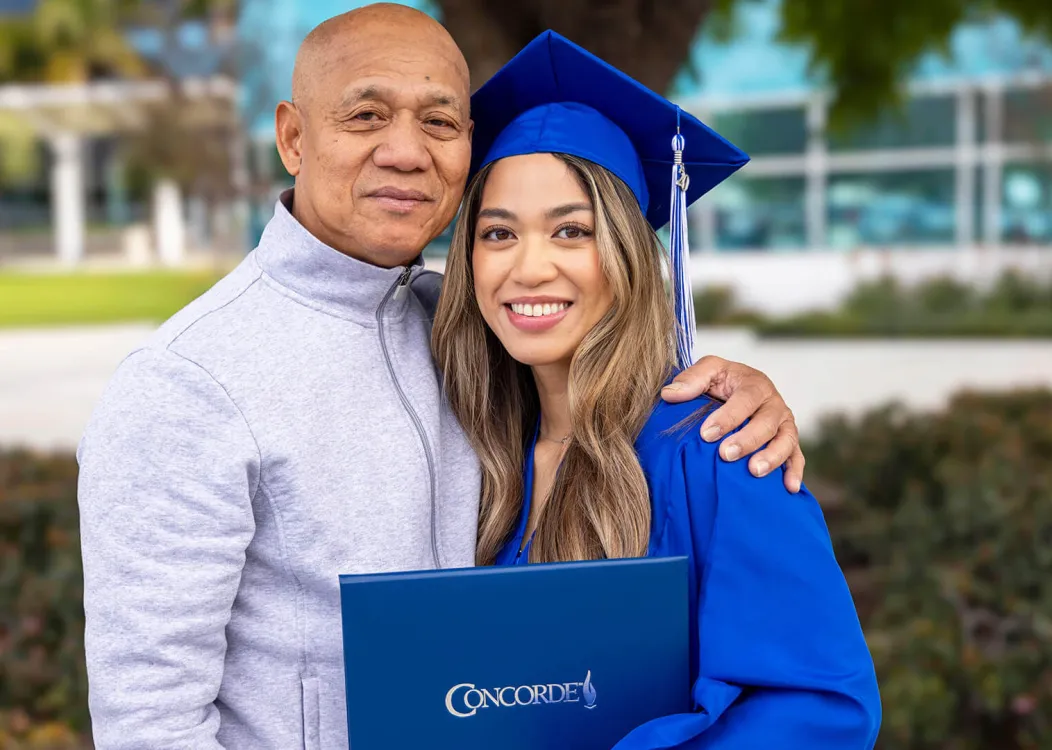Now Enrolling
Nursing Diploma Program Overview
From day 1 - you are a nursing student. When admitted into Concorde's practical or vocational nursing diploma programs you are focused on learning to become the best nurse you can. Simply stated, you are directly admitted into the nursing program.
Students will learn to apply theory in hands-on labs and applied clinical experiences.
As part of the program and in preparation for classroom, students are assigned clinical rotations where they will work alongside other healthcare professionals in caring for real patients. This is when your passion for helping others as a nurse can really shine.
The nursing program can be intense and fast-paced as the program may be completed in as few as 12 to 13-months.
Prior to graduation, you begin preparing for your state licensing exams through a series test-prep coursework and sessions. Your campus Director of Nursing (DoN) and instructors will work with you along your academic journey to help you pursue more than an education and more than a job - to follow a calling, as a nurse.
Get Started by Exploring Concorde's Nursing Diploma Programs
Do you have a passion for serving the health care needs of others? A career in practical nursing can put you on the front lines of patient care. You’ll also support physicians and RNs in an exciting, fast-paced environment. If you’ve been searching for LPN/LVN programs near you, Concorde might be the right fit and offers the practical nursing degree you need to enter the healthcare field.
Source: U.S. Bureau of Labor Statistics projected national growth in job openings for licensed practical/vocational nurses 2024-2034 https://www.bls.gov/ooh/healthcare/licensed-practical-and-licensed-vocational-nurses.htm Projections are national. Local job market demand may vary.
Get Started
Campuses
California
Colorado
Florida
Missouri
Oregon
Texas
Curriculum

Concorde's PN and VN programs emphasize a hands-on, nursing curriculum that helps equip you from day one to serve effectively in various health care settings. Once the program is completed, qualified graduates may sit for the NCLEX-PN or NCLEX-VN exam to become a Licensed Practical Nurse or Licensed Vocational Nurse respectively.
Nursing training prepares you with a focus on the following skills and knowledge:
- Preventive nursing care
- Therapeutic nursing care
- Rehabilitative nursing care
- Restorative nursing care
- Nursing interventions
- Provide safe, caring and compassionate nursing care to diverse patients across the lifespan in various healthcare settings using evidenced based practice to improve outcomes.
- Function as a competent, entry-level healthcare provider applying leadership and management skills and embracing ethical and legal principles in the provision of culturally appropriate nursing care.
- Collaborate with members of the inter-professional healthcare team to provide optimal care for diverse patients and their families.
- Communicate effectively through verbal, nonverbal and technological methods with patients, families and members of the inter-professional healthcare team.
Concorde's nursing programs blend theory with practical application in lab settings using simulations and practices, as well as through clinical rotations with local healthcare providers. Concorde's long relationships with key nursing clinical sites has enabled students to engage with a variety of healthcare professionals and attend to patients in need. Clinical hours are a requirement of professional state licensing boards must be completed prior to graduation and licensure exams.
Career Outlook
Where Can a Licensed Practical or Vocational Nurse Work?
Licensed Practical and Vocational Nurses provide basic nursing care and work under the direction of registered nurses and doctors.
They work in: nursing homes, extended care facilities, hospitals, physicians’ offices and in private homes under the supervision of physicians or registered nurses. LPNs help patients with daily activities such as bathing, dressing, eating and toileting. They dress wounds, install catheters, start IVs, monitor equipment, check vital signs, deliver medications and much more. While basic, their responsibilities are absolutely imperative to the quality of care. Among all care givers they have the most intimate hands-on relationship with their patients. Besides physicians' offices, LPNs can find employment in the following settings:
- Hospitals
- Long-term care facilities
- Physicians' offices
- Home health agencies
- Hospice agencies
How to Become a Licensed Practical or Vocational Nurse
Licensed practical and licensed vocational nurses must complete a state-approved practical nursing program, which typically takes about one year to complete (Concorde's programs typically are 13 months ). They also must pass a licensing exam following their LPN training.
The ideal LPN is a natural at building relationships. They are empathetic, trusting, flexible, good listeners and energetic. Most LPNs struggle initially with elements of the job such as toileting or exposure to blood, but the satisfaction derived from their patient relationships quickly mitigates those issues. Concorde's practical nursing programs prepare students to successfully handle all these tasks in all kinds of work settings.
Duties of LPNs and LVNs vary, depending on their work setting and the state in which they work. For example, they might reinforce teaching done by registered nurses regarding how family members should care for a relative; help to deliver, care for and feed infants; collect samples for testing and do routine laboratory tests; or feed patients who need help eating.
LPNs and LVNs might be limited to doing certain tasks depending on the state where they work. For example, in some states, LPN/LVNs with proper training can give medication or start intravenous drips, but in other states they cannot perform these tasks.
LPN/LVNs work full-time and might be scheduled during the day, evening or night. The work environment is team oriented and fast paced, but highly compassionate and professional.
How Does it Feel to be a Practical / Vocational Nurse
While the proximity to patient’s body functions and often-serious health issues may seem unpleasant, LPN/LVNs find the impact they have on patients' lives to be extraordinarily rewarding. They often become the closest companions and confidants to their patients and their families. LPN/LVNs are part of a very caring community which includes not only physicians and nurses, but rehabilitation and social therapists as well as aids and administrators.
The national demand for LVN/LPNs, according to the U.S. Bureau of Labor Statistics, will grow by 3% between 2024-2034. As the baby-boom population ages, the overall need for health care services is expected to increase. LPNs and LVNs will be needed in residential care facilities and in home health environments to care for older patients. The career path for LPN/LVNs is varied. Many return to school for an Associate or Bachelor's Degree and pursue licensing to become Registered Nurses. Registered Nurses often supervise LPN/LVNs, administer medications, perform diagnostic tests, record patient histories and symptoms, manage patients’ care plans, and consult more extensively with physicians. LPN/LVNs might also move into administrative roles in health care settings. Many experienced LPN/LVNs go into nursing education. Another option is to continue on after attaining a bachelor's degree and earn a master's in nursing. At that point, many go on to become nurse practitioners who see their own patients without supervision from a physician.
To enter the profession, one must attend and satisfy the requirements of a nursing program and take and pass the National Council Licensure Examination (NCLEX) for Practical/Vocational nurses.
Financial Aid
As part of our commitment to your success, Concorde ensures that you have access to comprehensive information and guidance in navigating the financial aid process. Concorde offers financial aid and scholarship programs to those who qualify.

Financial Aid
Get financial support for your education with our dedicated financial aid team by your side.
Review Your Options
Scholarships
Find the perfect scholarship for your health care goals based on your background, programs or other criteria.
Search ScholarshipsScholarship Opportunities
Healthcare Demand Grant
The Healthcare Demand Grant is designed to assist new, enrolling students who are pursuing education in a healthcare program. No application process. All newly enrolled students are reviewed for eligibility.
Previous Education Grant
The Previous Education Grant is designed to assist new, enrolling students who are pursuing education in a healthcare program and who have previously graduated from an accredited postsecondary institution with an associates, bachelors or masters degree.
First Responder Grant
Available to any first responder personnel intending to continue their education at Concorde Career College.
High School Senior Grant
Available to graduating high school seniors who have been issued a high school diploma or its equivalent and intend to continue their education at Concorde Career College or Concorde Career Institute.
Institutional Accreditation and Licensure
Accreditation and licensure are an important part of an academic institution’s operation.
Visit our Accreditations and Licensure page for more details about our accreditations and licensure.
Missouri State Board of Nursing
The Missouri Board of Nursing has granted full approval to the Practical Nursing program. Missouri Board of Nursing: P.O. Box 656, Jefferson City, MO 65102-0656; 573-751-0681; https://www.pr.mo.gov/nursing.asp.
Kansas City, MOColorado State Board of Nursing
The Practical Nursing program is approved by the Colorado State Board of Nursing.
Aurora, COACEN
The practical nursing program at Concorde Career College at the Aurora campus located in Aurora, Colorado is accredited by the: Accreditation Commission for Education in Nursing (ACEN).
Accreditation Commission for Education in Nursing (ACEN)
3390 Peachtree Road NE, Suite 1400 Atlanta, GA 30326
(404) 975-5000The most recent accreditation decision made by the ACEN Board of Commissioners for the practical nursing program is Continuing Accreditation.
Aurora, COFlorida Board of Nursing
The Practical Nursing program is approved by the Florida Department of Health, Division of Health, Division of Medical Quality Insurance, Florida Board of Nursing.
Jacksonville, FLBON
The Practical Nursing program at Concorde Career College-Portland campus has been granted continuing Board approval by the Oregon State Board of Nursing.
Portland, ORBVNPT
The Vocational Nurse program is approved by the California State Board of Vocational Nursing and Psychiatric Technicians (BVNPT). Board of Vocational Nursing and Psychiatric Technicians, 2535 Capitol Oaks Dr., Suite 205, Sacramento, CA 95833; 916-263-7800.
Garden Grove, CANorth Hollywood, CASan Bernardino, CASan Diego, CATexas Board of Nursing
The Vocational Nursing program has been granted full approval by the Texas Board of Nursing (BON). Texas Board of Nursing: 333 Guadalupe Street, Suite 3-460, Austin, TX 78701; 512-305-7400; https://www.bon.texas.gov
Dallas, TXGrand Prairie, TX
Frequently Asked Questions

Didn't find the answer to your question? Send us an inquiry and we will be happy to answer all your questions!
These are the same job roles. The biggest difference between these two programs is the name, which varies by state. For example, in both California and Texas, this type of nurse is called a VN, while in Florida, Colorado, and Oregon, the LPN name applies. Both LVNs and LPNs work under RNs and doctors and prepare you to take the NCLEX-PN examination to gain licensure. Concorde offers LPN career training as well through our PN Diploma program.
You can complete the PN (Practical Nursing) program in as little as 13 months. However, program length can vary by Concorde campus. Please check with an admissions advisor for program length information.
Call us to find out when the Practical Nursing Program starts at a Concorde campus location near you. Program start dates are also listed in the campus catalog.
According to BLS.gov, the National Employment Demand 2024-2034 for the Practical Nurse job field is projected to grow 3%. As the healthcare needs of baby boomers increase, the continuing need for LPNs is expected to rise.
Source: U.S. Bureau of Labor Statistics projected national growth in job openings for licensed practical/vocational nurses 2024-2034 https://www.bls.gov/ooh/healthcare/licensed-practical-and-licensed-vocational-nurses.htm Projections are national. Local job market demand may vary.
LPNs generally monitor patient vitals, perform basic healthcare duties, and report to the RN within their work environment. The extent of medical care they can provide depends on their training and state regulations. Because the need for LPNs is rising, their salaries grow exponentially as nurses take on more responsibility. You also have an opportunity to transition into becoming an RN.
Concorde incorporates real-world training and off-site clinical experiences in our programs.
For program-specific tuition information, please see the campus catalog.
You can complete the Vocational Nurse program in as little as 13 months. However, program length can vary by Concorde campus. Please check with an admissions advisor for program length information.
Call us to find out when the Vocational Nursing Program starts at a Concorde campus location near you. Program start dates can also be found in the campus catalog.
According to BLS.gov, the National Employment Demand 2024-2034 for the Vocational Nurse job field is projected to grow 3%. As the healthcare needs of baby boomers increase, the continuing need for LVNs is expected to rise.
Source: U.S. Bureau of Labor Statistics projected national growth in job openings for licensed practical/vocational nurses 2024-2034 https://www.bls.gov/ooh/healthcare/licensed-practical-and-licensed-vocational-nurses.htm Projections are national. Local job market demand may vary.
Vocational nurses enjoy working in a fast-paced environment. They assist patients with daily living, monitor activity, and provide bedside care. You also have an opportunity to transition into becoming an RN.
Concorde incorporates real-world training and off-site clinical experiences in our programs.
For program-specific tuition information, please see the campus catalog.











